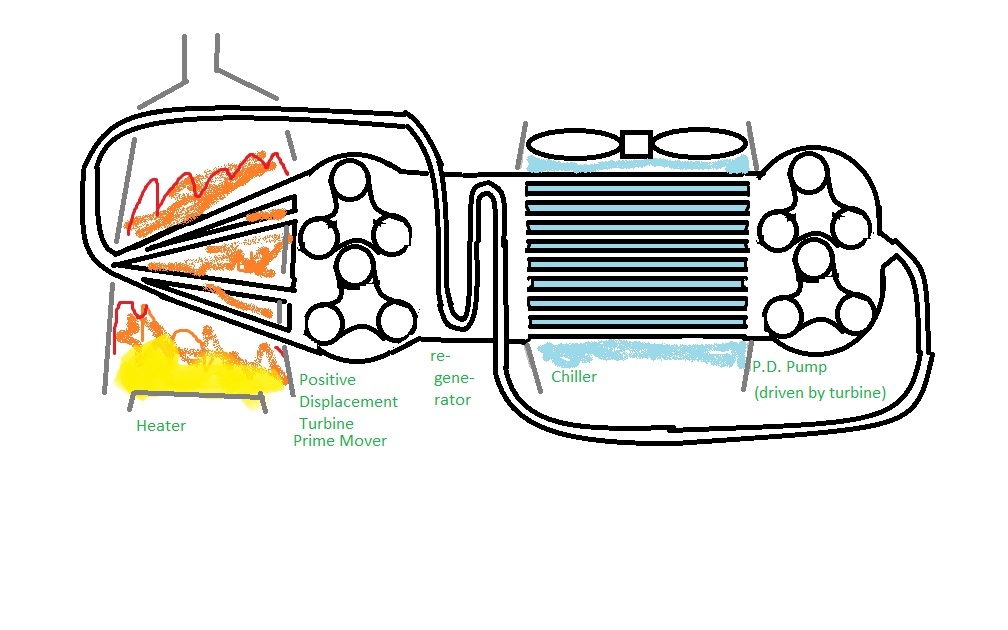
Stirling-Inspired Turbine
-
pete4513454
- Posts: 2
- Joined: Wed Feb 08, 2012 1:51 pm
Stirling-Inspired Turbine
I thought this up the other day. Could something like this work to turn a temperature differential into mechanical power? I


Re: Stirling-Inspired Turbine
Pete,
I think honestly that this engine (gas beared) will not work. this is because the flow is unidirectional (and symmetric) in a closed cycle, (and has no mismatches that allow triggering pulse, as is the case for the Stirling).
Is demonstrated that in the same symmetrical situation (with no mismatches) also the Stirling does not operate.
However, if you consider this as a motor utilizing the water (instead of a gas) will work very well, and without the use of pulses, but only by using the phase change of the fluid between steam (left), and water condensed from the steam (right); the two "lobe motor/pumps" will be greatly of different in sizes; very large on the left, and instead very small in the right, since in the first will act with thousands of times larger volumes than the other.
This huge dissymmetry of the volumes allows the extraction of work.
This engine (closed cycle of water steam) has already been invented a lot of time ago (including the regeneration which is called preheating) and the cycle is called "Rankine", more commonly is said "steam engine".
All the thermoelectric units of power production plants (including nuclear ones) use this cycle.
This in simple. I'm allowable to explain you better.
Ferraccio
I think honestly that this engine (gas beared) will not work. this is because the flow is unidirectional (and symmetric) in a closed cycle, (and has no mismatches that allow triggering pulse, as is the case for the Stirling).
Is demonstrated that in the same symmetrical situation (with no mismatches) also the Stirling does not operate.
However, if you consider this as a motor utilizing the water (instead of a gas) will work very well, and without the use of pulses, but only by using the phase change of the fluid between steam (left), and water condensed from the steam (right); the two "lobe motor/pumps" will be greatly of different in sizes; very large on the left, and instead very small in the right, since in the first will act with thousands of times larger volumes than the other.
This huge dissymmetry of the volumes allows the extraction of work.
This engine (closed cycle of water steam) has already been invented a lot of time ago (including the regeneration which is called preheating) and the cycle is called "Rankine", more commonly is said "steam engine".
All the thermoelectric units of power production plants (including nuclear ones) use this cycle.
This in simple. I'm allowable to explain you better.
Ferraccio
Re: Stirling-Inspired Turbine
Explaining more clearly (and strictly excluding the Stirling which is another thing), there is "theoretically" the possibility of extracting energy (and therefore work).
The calculation has to be related to the volumes displaced, that are related to absolute temperature (degrees Kelvin): From a simple calculation it is clear that, considering the frictions, losses, and reasonable values of temperature (the cooler should have a reasonable size) it is clear that the motor can not work.
In theoretical way instead it function.
The calculation has to be related to the volumes displaced, that are related to absolute temperature (degrees Kelvin): From a simple calculation it is clear that, considering the frictions, losses, and reasonable values of temperature (the cooler should have a reasonable size) it is clear that the motor can not work.
In theoretical way instead it function.
Re: Stirling-Inspired Turbine
Hi Pete,
That's essentially what they do in power stations, so yes, it would work.
That's essentially what they do in power stations, so yes, it would work.
Re: Stirling-Inspired Turbine
hi pete
You draw engine which is something between Stoddard engine-cycle and Brayton engine-cycle but this is not Stirling cycle. And of course it will work if turbine has bigger flow rate of pump-compressor.
some information:
http://en.wikipedia.org/wiki/Stoddard_cycle
http://en.wikipedia.org/wiki/Ericsson_cycle
http://en.wikipedia.org/wiki/Brayton_cycle
http://en.wikipedia.org/wiki/Thermodynamic_cycle
Salute!
You draw engine which is something between Stoddard engine-cycle and Brayton engine-cycle but this is not Stirling cycle. And of course it will work if turbine has bigger flow rate of pump-compressor.
some information:
http://en.wikipedia.org/wiki/Stoddard_cycle
http://en.wikipedia.org/wiki/Ericsson_cycle
http://en.wikipedia.org/wiki/Brayton_cycle
http://en.wikipedia.org/wiki/Thermodynamic_cycle
Salute!
Re: Stirling-Inspired Turbine
Goat: in power station is NOT used air,
is used water steam, and this is a completely different thing,
There are different cyles, seems like a good soup, but are not the same thing.
Ferraccio
is used water steam, and this is a completely different thing,
There are different cyles, seems like a good soup, but are not the same thing.
Ferraccio